 EDITOR'S PICK
EDITOR'S PICK
Kandi Technologies Emerges as Key Player in China's Battery Swap Revolution
12 Aug 2025 | Synopsis
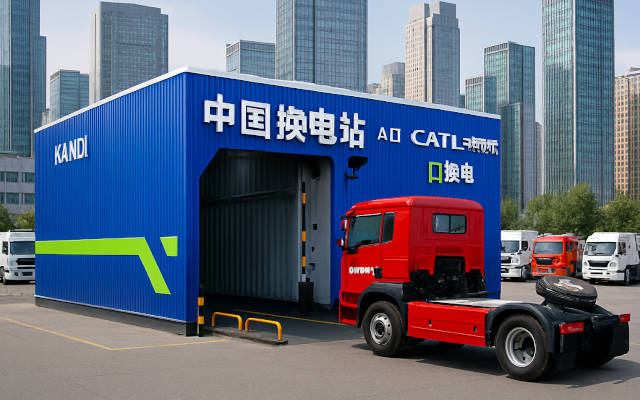 Kandi Technologies - a once modest budget EV maker - is now a central player in China's battery swap infrastructure. Its subsidiary, China Battery Exchange, will supply key components (station structures, robotic arms, thermal modules) for CATL's ambitious plan to deploy over 10,000 swap stations nationwide. With 90-second swaps, both single-use and subscription pricing, Kandi is targeting fleet operators while drawing investor attention.
Kandi Technologies - a once modest budget EV maker - is now a central player in China's battery swap infrastructure. Its subsidiary, China Battery Exchange, will supply key components (station structures, robotic arms, thermal modules) for CATL's ambitious plan to deploy over 10,000 swap stations nationwide. With 90-second swaps, both single-use and subscription pricing, Kandi is targeting fleet operators while drawing investor attention.Ford Throws Out Henry Ford's Assembly Line To Make Low-Cost EVs In America
12 Aug 2025 | Synopsis
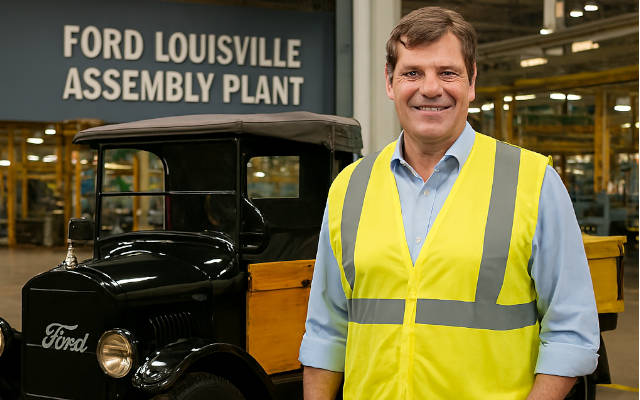 Ford is scrapping its century-old straight-line assembly line for a three-branch "assembly tree" setup, enabling parallel construction of EV modules. Investing almost $5 billion, Ford will retool its Louisville plant, aiming to produce a mid-size electric pickup starting at $30,000 in 2027. Powered by cost-effective domestic LFP batteries, the overhaul is designed to cut assembly complexity, speed up production, and bolster U.S. competitiveness.
Ford is scrapping its century-old straight-line assembly line for a three-branch "assembly tree" setup, enabling parallel construction of EV modules. Investing almost $5 billion, Ford will retool its Louisville plant, aiming to produce a mid-size electric pickup starting at $30,000 in 2027. Powered by cost-effective domestic LFP batteries, the overhaul is designed to cut assembly complexity, speed up production, and bolster U.S. competitiveness.Return of the Chevy Camaro, But This Time It's An Electric SUV
12 Aug 2025 | Synopsis
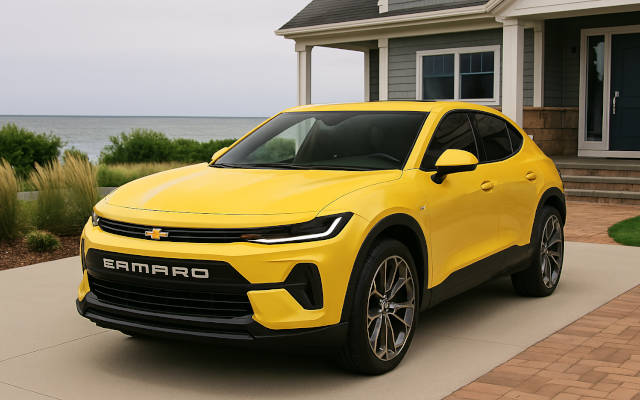 The Camaro is set to return as an electric fastback SUV - not a coupe - slated for fall 2026. Expected variants range from single-motor, rear-drive models (241–365 hp) to dual-motor AWD (300 hp) and high-performance SS (615 hp) trims, with a possible 1,000-hp ZL1 using Hummer EV tech. Battery options likely include 85 kWh and 102 kWh packs, with charging up to 190 kW. Prices are estimated between $36,000 and $65,500.
The Camaro is set to return as an electric fastback SUV - not a coupe - slated for fall 2026. Expected variants range from single-motor, rear-drive models (241–365 hp) to dual-motor AWD (300 hp) and high-performance SS (615 hp) trims, with a possible 1,000-hp ZL1 using Hummer EV tech. Battery options likely include 85 kWh and 102 kWh packs, with charging up to 190 kW. Prices are estimated between $36,000 and $65,500.Dozens Of New Electric Bus Routes For Vietnam's Ho Chi Minh City
08 Aug 2025 | Synopsis
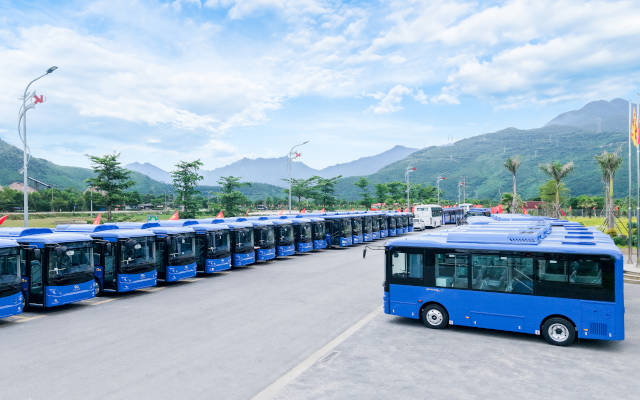 Ho Chi Minh City introduced 27 new electric bus routes on August 1, adding 443 electric buses and boosting its total EV fleet to 613—now over 26% of its public bus system. Combined with around 500 CNG buses, almost half the fleet runs on clean energy. The new vehicles - models B30‑EV and B60‑EV - offer 30–60 seats, GPS, onboard cameras, free Wi‑Fi, automated announcements, and cashless payment. Authorities aim for a fully green bus fleet by 2030.
Ho Chi Minh City introduced 27 new electric bus routes on August 1, adding 443 electric buses and boosting its total EV fleet to 613—now over 26% of its public bus system. Combined with around 500 CNG buses, almost half the fleet runs on clean energy. The new vehicles - models B30‑EV and B60‑EV - offer 30–60 seats, GPS, onboard cameras, free Wi‑Fi, automated announcements, and cashless payment. Authorities aim for a fully green bus fleet by 2030.Tesla "Activist Shareholders" Sue Company And Elon Musk For Robotaxi Rollout
08 Aug 2025 | Synopsis
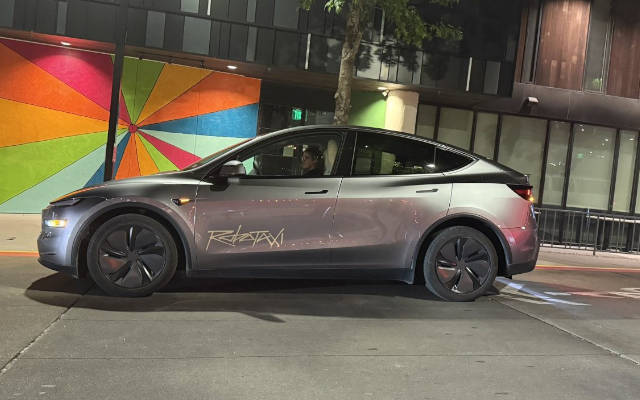 Tesla and CEO Elon Musk are being sued by activist shareholders in a proposed class‑action filed in Austin, Texas, accusing the company of securities fraud for concealing "significant risk" in its Robotaxi rollout, launched June 22, 2025. The suit cites videos showing unsafe behavior - speeding, sudden braking, wrong‑lane driving, dropping passengers mid‑road - and alleges these misrepresentations inflated stock value.
Tesla and CEO Elon Musk are being sued by activist shareholders in a proposed class‑action filed in Austin, Texas, accusing the company of securities fraud for concealing "significant risk" in its Robotaxi rollout, launched June 22, 2025. The suit cites videos showing unsafe behavior - speeding, sudden braking, wrong‑lane driving, dropping passengers mid‑road - and alleges these misrepresentations inflated stock value.
 Si Exclusive
Si Exclusive
Hydrogen's Flight Path: Fuel Cells, Turbines, and the Economics of Clean Aviation
10 Oct 2025 |  Aviation is shifting from Jet A to four fuel systems: electricity, hydrogen (fuel cell and combustion), SAF, and petroleum. Fuel cells suit short-haul aircraft; hydrogen combustion may power long-range jets. SAF bridges legacy fleets. Hydrogen costs - $5-$7/kg today, possibly $2/kg by 2040 - impact ticket prices and infrastructure decisions. Airport authorities, airlines, and governments will share deployment costs. Each fuel has distinct environmental pros and cons shaping aviation's net-zero future.
Aviation is shifting from Jet A to four fuel systems: electricity, hydrogen (fuel cell and combustion), SAF, and petroleum. Fuel cells suit short-haul aircraft; hydrogen combustion may power long-range jets. SAF bridges legacy fleets. Hydrogen costs - $5-$7/kg today, possibly $2/kg by 2040 - impact ticket prices and infrastructure decisions. Airport authorities, airlines, and governments will share deployment costs. Each fuel has distinct environmental pros and cons shaping aviation's net-zero future.
 10 Oct 2025 23:11:45 UTC |
RECENT PODCASTS
BYD Soars - Cheaper Tesla Models - The Bolt is Back - Rivian
SEARCH RSSTREAM
 53 New Postings In Past 24 Hours
53 New Postings In Past 24 Hours
Category:finance
Region:NoAmerica
Date:10 Oct 2025
Category:policy
Region:NoAmerica
Date:10 Oct 2025
Category:mobility
Region:AsiaPacific
Date:10 Oct 2025
Category:mobility
Region:AsiaPacific
Date:10 Oct 2025
Category:finance
Region:NoAmerica
Date:10 Oct 2025
Category:finance
Region:IndoAsia
Date:10 Oct 2025
Category:energy
Region:Global
Date:10 Oct 2025
Category:energy
Region:NoAmerica
Date:10 Oct 2025
Category:finance
Region:NoAmerica
Date:10 Oct 2025
Category:finance
Region:Global
Date:10 Oct 2025